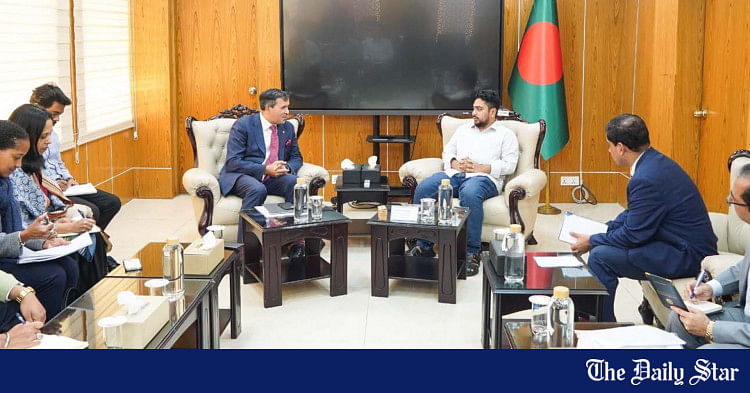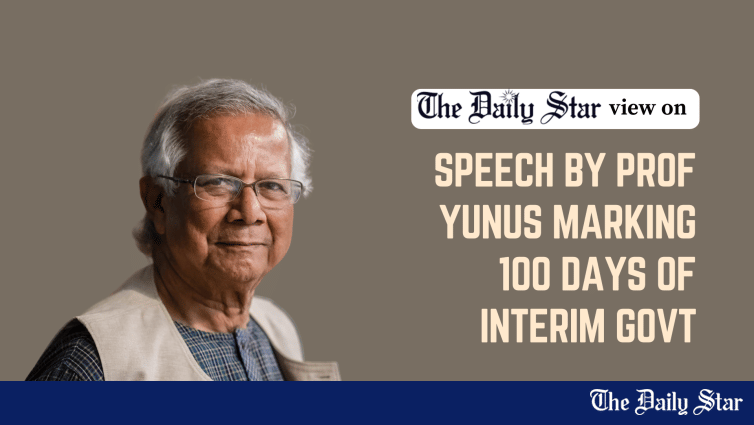Saif
Senior Member
- Joined
- Jan 24, 2024
- Messages
- 15,397
- Reaction score
- 7,874
- Nation

- Residence

- Axis Group


People won’t tolerate govt’s incompetence
BNP acting chairman Tarique Rahman yesterday urged the interim government to manifest its commitment to ensuring people’s voting rights through a credible election in a bid to strengthen ties with people and build their trust.
People won’t tolerate govt’s incompetence
Says Tarique

Photo: Courtesy/UNB
BNP acting chairman Tarique Rahman yesterday urged the interim government to manifest its commitment to ensuring people's voting rights through a credible election in a bid to strengthen ties with people and build their trust.
Speaking at a council, he also warned that people will not tolerate the government's incompetency in running the country.
"The interim government has already taken an initiative to restructure the Election Commission. People expect to cast their votes freely, without fear, in a neutral and transparent environment and to elect their representatives," the BNP leader said.
He said the relationship between the government and people will grow stronger if the public can maintain their confidence in it.
"When people will see that the government is genuinely working to uphold their voting and other fundamental rights, their trust in the government will naturally deepen."
Tarique virtually addressed the concluding session of the third National Council of the Jatiyatabadi Textile Engineers Association of Bangladesh as the chief guest at the Institution of Engineers, Bangladesh.
"If the political and economic empowerment of the people is not ensured, then no matter what we call democracy, development, or reform, none of it will be sustainable," Tarique said.
He also said the main tool of a citizen's political power is the right to vote. "If people are not given the opportunity to exercise their right to vote, their relationship and partnership with the state will not be established."
Tarique said the deposed autocrats and their associates, both within the country and abroad, as well as elements within the administration, are actively working to fail the interim government. "If they succeed in undermining this government, they will also fail democracy and the millions of Bangladeshis who cherish democratic values," the BNP leader said.
In such a situation, he said, some decisions of the interim government appear to ignore the people's aspirations, instead imposing what they believe is best for the public.
Tarique also said if priorities are set incorrectly during the reform process, it will be seen by the people as a sign of the government's inefficiency.
Speaking at the programme, BNP Secretary General Mirza Fakhrul Islam Alamgir said the country is facing a very critical time. "We must navigate this period with great caution."
He urged the interim government to quickly complete the necessary electoral reforms to ensure credible and acceptable elections, in line with the people's wishes.
Tarique also called on BNP leaders and activists to preserve the party's image by refraining from any wrongdoings and standing firm against any form of injustice.
BNP Standing Committee members Dr Abdul Moyeen Khan and Dr AZM Zahid Hossain, among others, addressed the programme, with Jatiyatabadi Textile Engineers Association of Bangladesh President Fakhrul Alam in the chair.
Says Tarique
Photo: Courtesy/UNB
BNP acting chairman Tarique Rahman yesterday urged the interim government to manifest its commitment to ensuring people's voting rights through a credible election in a bid to strengthen ties with people and build their trust.
Speaking at a council, he also warned that people will not tolerate the government's incompetency in running the country.
"The interim government has already taken an initiative to restructure the Election Commission. People expect to cast their votes freely, without fear, in a neutral and transparent environment and to elect their representatives," the BNP leader said.
He said the relationship between the government and people will grow stronger if the public can maintain their confidence in it.
"When people will see that the government is genuinely working to uphold their voting and other fundamental rights, their trust in the government will naturally deepen."
Tarique virtually addressed the concluding session of the third National Council of the Jatiyatabadi Textile Engineers Association of Bangladesh as the chief guest at the Institution of Engineers, Bangladesh.
"If the political and economic empowerment of the people is not ensured, then no matter what we call democracy, development, or reform, none of it will be sustainable," Tarique said.
He also said the main tool of a citizen's political power is the right to vote. "If people are not given the opportunity to exercise their right to vote, their relationship and partnership with the state will not be established."
Tarique said the deposed autocrats and their associates, both within the country and abroad, as well as elements within the administration, are actively working to fail the interim government. "If they succeed in undermining this government, they will also fail democracy and the millions of Bangladeshis who cherish democratic values," the BNP leader said.
In such a situation, he said, some decisions of the interim government appear to ignore the people's aspirations, instead imposing what they believe is best for the public.
Tarique also said if priorities are set incorrectly during the reform process, it will be seen by the people as a sign of the government's inefficiency.
Speaking at the programme, BNP Secretary General Mirza Fakhrul Islam Alamgir said the country is facing a very critical time. "We must navigate this period with great caution."
He urged the interim government to quickly complete the necessary electoral reforms to ensure credible and acceptable elections, in line with the people's wishes.
Tarique also called on BNP leaders and activists to preserve the party's image by refraining from any wrongdoings and standing firm against any form of injustice.
BNP Standing Committee members Dr Abdul Moyeen Khan and Dr AZM Zahid Hossain, among others, addressed the programme, with Jatiyatabadi Textile Engineers Association of Bangladesh President Fakhrul Alam in the chair.





